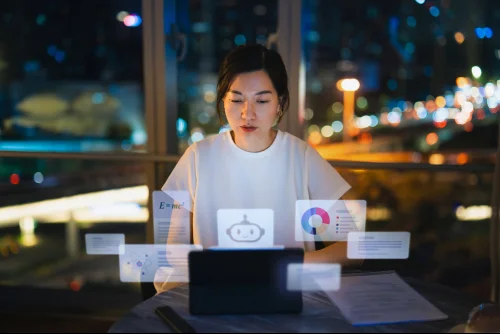How AI Is Turning High School Students Into the Next Generation of Entrepreneurs
As published in

As AI reshapes education, students are turning school problems into products and building the future economy.

This is the third installment in the "1,000 Days of AI" series. I've had a front-row seat to K-12 education's transformation — working with school systems worldwide as an AI education consultant to develop school district AI strategies and watching something remarkable unfold. The change didn't come from curriculum committees or federal mandates, but from students who, as always, refused to wait for permission.
While educators debated whether ChatGPT constituted cheating, 17-year-old high schooler Zach Yadegari built an AI app generating $1.12 million in monthly revenue. He began coding at age seven, initially creating a gaming website to bypass his elementary school's firewalls. By 16, he'd already sold his first company for $100,000.
The stark reality: AI has already changed everything
Within 1,000 days, ChatGPT has fundamentally challenged traditional K-12 education. According to ACT research, 70% of high school students used AI tools in 2023-24, up from 58% the previous year. Pew Research confirms ChatGPT usage for schoolwork doubled from 2023 to 2024. But these statistics miss the real story: Students aren't just using AI to complete assignments — they're using it to build businesses, forcing schools to rapidly develop AI policies that balance innovation with responsible AI use in education.
The traditional model assumed knowledge was scarce and teachers were gatekeepers. AI shattered both assumptions overnight. Every student now has access to infinite tutoring, instant expertise and tools that turn ideas into products in hours, not years. The question isn't whether students should learn entrepreneurship — they already are.
From high school hallways to revenue streams
The most successful young entrepreneurs started as intrapreneurs within the school system itself. High school students across the country are transforming their AI skills into real businesses. Students nationwide are selling AI-generated study guides to classmates for $50-$500 monthly.
The irony isn't lost on me: What adults call cheating, these students call market research. What teachers label shortcuts, investors recognize as minimum viable products. In my work helping districts with developing AI policy for schools, I've seen how these entrepreneurial students actually exemplify AI education best practices — they're solving real problems with real tools.
The intrapreneurs inside our schools
Not all innovation happens outside school walls. Student intrapreneurs are creating AI tutoring programs for struggling peers, building attendance apps for their schools and developing mental health chatbots for counselors. They see school problems as product opportunities, transforming education while living it.
Teachers are becoming intrapreneurs, too. Forward-thinking educators use AI to create personalized learning paths, automate grading to spend more time with students and build tools that spread district-wide. These educator-intrapreneurs bridge institutional requirements and student innovation, creating space for experimentation within existing structures while contributing to AI curriculum development for K-12.
The federal framework meets grassroots reality
In April 2025, President Trump signed "Advancing Artificial Intelligence Education for American Youth," establishing the White House Task Force on AI Education. The executive order creates the Presidential AI Challenge to "encourage and highlight student and educator achievements in AI" across multiple age categories. This isn't just another science fair — it's federal recognition that K-12 students are already AI practitioners, validating the school district AI strategies that forward-thinking administrators have been developing.
Crucially, the Presidential AI Challenge calls for students to "use AI to address community challenges," validating what student entrepreneurs have been doing all along. The framework emphasizes that AI education must "spark curiosity and creativity," but students aren't preparing to participate — they're already leading. This federal backing provides the cover innovative schools need to transform detention into incubation and homework into hackathons, establishing new AI education best practices along the way.
3 practical steps for schools right now
1. Implement "innovation hours" aligned with the Presidential AI Challenge:
Dedicate weekly time for students to work on AI projects addressing real community problems. Let students form ventures, not just groups. Let them pursue customers, not just grades. Schools implementing this now will have students ready when the Presidential AI Challenge launches. This approach to AI curriculum development for K-12 turns theory into practice.
2. Transform detention into incubation:
Every student "caught" using AI creatively should be redirected, not punished. Create an "AI Innovation Council" where rule-benders become rule-makers. Have them develop your school's AI policy and teach AI literacy to younger students. The White House Task Force calls for student-educator collaboration — make your "problem students" your problem solvers. This is responsible AI use in education at its best.
3. Create intrapreneurship pathways:
Establish formal recognition for students improving school operations through AI. Give course credit for building tools the school actually uses. Partner with local businesses for real-world projects. Every pizza shop and dental office needs AI help. Your students can provide it while earning money and credits. These pathways should be central to any school district AI strategy.
The next 1,000 days: Bigger challenges, bigger opportunities
The first 1,000 days proved that students could use AI. The next 1,000 days will prove they can lead with it. As AI becomes more powerful, the gap between students with access and support versus those without will widen exponentially. A student with ChatGPT, supportive teachers and entrepreneurial parents will build companies. A student with restricted access and punitive policies will fall behind — not by years, but by generations.
The mental health implications are staggering. When 14-year-olds can build million-dollar businesses, what happens to those who can't? When AI can do homework in seconds, how do we measure learning? These aren't distant philosophical questions; they're immediate challenges requiring thoughtful approaches to developing AI policy for schools.
The next 1,000 days will see AI-native students enter the workforce. I can't wait to see how they reshape entire industries. The concept of "entry-level" will dissolve when teenagers arrive with more AI experience than senior executives.
The entrepreneurial imperative
Schools that thrive won't be those with the best AI policies or detection tools. They'll be those cultivating intrapreneurs — students and teachers who transform systems from within. Every student who builds a tool to help classmates is an intrapreneur. Every teacher experimenting with AI to improve outcomes is an intrapreneur. Every administrator creating space for innovation enables intrapreneurship.
After 1,000 days of ChatGPT in K-12 education, one truth emerges: Students who embraced AI as a tool for creation rather than completion are building the future economy. They're intrapreneurs transforming schools from within and entrepreneurs building alternatives from without.
The next 1,000 days will be exponentially more complex. AI will become more powerful, accessible and essential. Students who start building now will have compounded advantages. For educators, parents and policymakers seeking guidance from an AI keynote speaker for education or looking to establish AI education best practices, the path forward is clear: Embrace intrapreneurship, enable entrepreneurship, and expect transformation. The federal government has provided the framework through the Presidential AI Challenge. Now it's time for local action.
The kids aren't just alright — they're already ahead. The question for the next 1,000 days isn't whether students will use AI to transform education and the economy. They will. The question is whether we'll help them build something better or watch them build around us.
Coming next in the "1,000 Days of AI" series: Legal's AI transformation — where precedent meets algorithms, and why your next lawyer might be an AI that passed the bar exam on its first try.

What Alex Can Do For You
Developed and led AI and Innovation strategy for multiple Fortune 100 companies, driving double-digit revenue growth.
Over 20 years of hands-on experience driving transformative business and technology solutions for global brands like Dell, Amgen, IBM, Pfizer, and Cisco.
Recognized by Forbes as “One of the World’s Top Experts on Innovation” and named a “Top AI Keynote Speaker to Watch.”
Frequent contributor to Forbes, Entrepreneur, and Fast Company, sharing actionable insights on AI strategy, the future of work, and innovation.
What sets Alex apart from other top AI speakers and innovation experts?
With AI and innovation elevated to buzzwords, there are plenty of speakers in this space. While many offer insightful keynotes, few can bring the depth of understanding, hands-on experience, and diverse viewpoints that Alex can. Alex doesn’t just talk about AI and innovation. He’s led it at Dell, Pfizer, and Cisco. He’s sat across from C-Suite execs to build global innovation plans. And he’s resonated with audiences at Google, AWS, Disney, Coca Cola, and dozens of other companies with keynotes tailored to their unique AI opportunities. A frequent contributor to Forbes, Inc., Entrepreneur, and Fast Company, Alex has been identified as a Top AI Voice on LinkedIn. He is also the author of a Wall Street Journal Bestseller, Fearless Innovation. Alex’s style is personable, approachable, and human. It’s never caught up in techspeak, or jargon so he resonates with any audience. Learn more about what sets Alex apart. Get in touch.
How does Alex customize keynotes and workshops?
No two organizations’ AI or innovation opportunities, or challenges, are the same. So canned keynotes or one-size-fits-all workshops just won’t do. Instead, Alex uses AI and data to tailor his engagements with available pre-event surveys. Analyzing responses, Alex customizes his content to address key needs and pain points, ensuring his message is meaningful. Speaking with leadership and other event stakeholders, Alex further customizes the content to ensure resonance and relevance, engaging audiences. Add it all up and you have keynotes and workshops that feel like they’ve been created for you—because they were. Learn more about Alex’s methodology. Get in touch.
What events and audiences are right for Alex?
With so much experience leading large-scale innovation initiatives, Alex is able to reach and resonate with any audience, no matter their knowledge level, industry, culture, or department. Captivating audiences from a live stage, or a virtual event, Alex is a fixture at C-Suite summits, innovation conferences, policy talks, offsites, and employee all hands meetings, plus governmental and academia events. An audience looking for fresh perspectives, real solutions, and custom content will find Alex’s keynotes engaging and actionable with ideas they can start applying right away. Curious about Alex’s recommendations for your event? Get in touch.
What companies and organizations have worked with Alex?
Alex’s roster of past clients, keynote engagements, and employers reads like a Wikipedia entry of the world’s most innovative, respected organizations. Disney, Coca Cola, ISO, AWS, Google, LEGO, CAT, IBM, Cisco, Dell, and dozens of other organizations have benefited from Alex’s keynotes, workshops, and strategic advisory services. As the former Managing Director of Innovation Strategy at Cisco, leader of global Innovation Centers and Smart City programs in 7 countries, and creator of innovation tracks for 3 Olympics, Alex’s real-world experience magnifies his impact upon any organization he partners with. Additionally, Alex has worked hands-on with governments, industry groups,startups and scaleups, plus large academic institutions, like the University of Delaware and The University of California, impacting 300,000+ students and thousands of faculty.
What topics does Alex Goryachev cover in keynotes and workshops?
While every keynote or workshop is customized to an event or audience, Alex is often requested by clients to bring a fresh perspective and real-world expertise on topics, including: AI’s impact on work and education Innovation in the age of AI Building buy-in and reducing hesitancy towards AI Policy and ethics related to AI C-Suite and leadership insights on AI Employee engagement in innovation The impact of AI on society Use cases, solutions, and strategies for AI and innovation Innovation culture and proven frameworks Reskilling and workforce preparedness Education and academia policy Government AI policy and legislation For additional topic ideas and recommendations for your event, get in touch.
Turn your next event into AI and innovation action.
These aren’t just better ways to use ChatGPT, or create short-term buzz. This is what the most influential organizations on earth use to shape the future.





